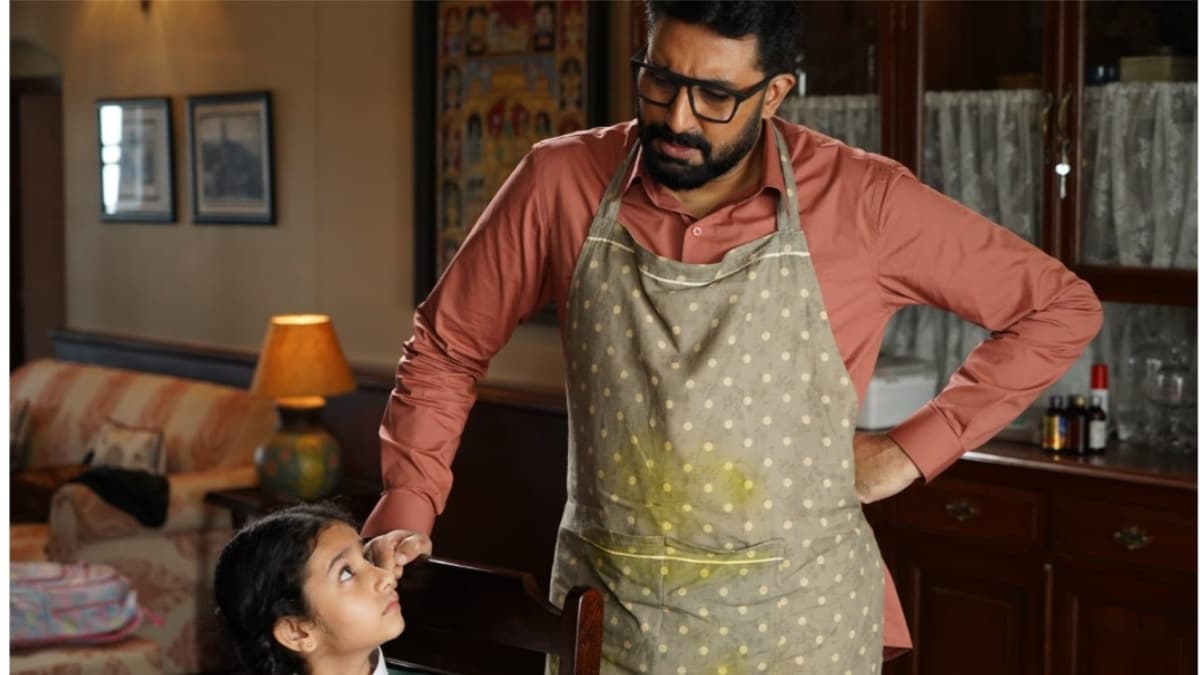Be Happy is written and directed by choreographer turned director Remo D’Souza. The choreography and music is fabulous, what it lacks is a solid script though the story is impressive which talks about hope and dream that is going to make you laugh and cry at the same time. Nothing out of the box, but the climax is sad.
.. very sad.

Not only is Abhishek Bachchan phenomenal in the film, but the little package Inayat Verma will steal your heart. WATCH the EXCLUSIVE video interview of Abhishek Bachchan, Inayat and Remo D’Souza on Be Happy here: Audiences need to understand that he has a very different style of acting, unlike his father. He isn’t an over-the-top actor, but a very fine craftsman.
Hence, he is underrated, which shouldn’t be the case. In an EXCLUSIVE interview with Firstpost’s Lachmi Deb Roy, he talks about his style of acting, how he breathes life into characters. Edited excerpts from the interview: How much fun did you have while making Be Happy ? Filmmaking is the world of make-believe.
We glorify lies so none of us had any fun at all. Do we look happy from any angle? We all were upset while making the film knowing it would be called Be Happy . Filmmaking is a very somber process and that’s exactly what the mood of the film was.
How much do you relate to the role since you’re a father in real life as well? Do you get emotional while playing such roles? You have to relate to all the characters you play. The reason why your director trusts you is because he believes you can breathe life into it and make it truthful. Whether I’m doing a Refugee or a Sarkar or a Jhoom Barabar Jhoom or a Paa or a Bol Bachchan or a Happy New Year or a Ludo or a Dasvi , you have to make it truthful.
That’s the only way you can convince the audience. Because I’m a father in real life, it’s easier to understand those emotions because you’ve experienced them or maybe you don’t have to manufacture them. You can just feel them.
When you see yourself in the mirror, is it Abhishek Bachchan that you see or is it the character that you are playing? I’m not much of a method actor. I’ve studied the method and all but I find it very demanding and it doesn’t work for me in entirety. You manage to find the balance between the two.
It’s also weird because every time you look into the mirror, you’re looking at Abhishek. Cinema is changing. There’s no hero or heroine.
Every character plays an important part. What do you have to say about it? I’m a bit conflicted about it because I come from a thought process where no matter when the film is being made, even the smallest of roles have a huge contribution in making it a success. A story also becomes interesting when the characters become interesting.
I come from that school of thought where everyone is important. It’s not anything out of the norm for me. Different stories require different kinds of narrative.
It’s not necessarily about the hero and the heroine, there are many characters around them. I understand what you’re asking that the attention has shifted from the hero but that’s media created. I feel you’ll have a very difficult job when you have to put down in words what needs to be felt.
The only people who can do that are poets, and then film critics and journalists. A film critic has to see a film and decide whether he liked it or not. It’s not made to be analysed but felt.
You have to sometimes break it down methodically and that too in a cold manner. It’s nice that a question like this is being asked. What’s your take on the evolution of OTT? They have evolved in our country.
I think the requirements are very different here, the requirement of entertainment is very different. Our definition of entertainment and art is different from another country’s definition. French cinema is wonderful but if you show it to a person who has grown on an appetite of Indian films, it might not entertain them because culturally the context is very different.
What digital platforms have done is that they made cinema from all countries accessible. Is it palatable to the society is yet to be seen? There are certain things about Indian cinema we should not lose. The themes of poetic justice are very much synonymous with Indian cinema, I love that.
My grandfather once told me the best thing about Indian cinema is you get to see poetic justice in three hours. Are we making for the art of it or the commerce of it; is again a big question. Does the pressure of commerce reduce when a film streams on the digital platform? It’s termed commerce, it’s about the success of the film.
It’s that many people have enjoyed watching it. How do you quantify that? By ticket sales. You release a film on a mass platform because you want maximum people to watch it and enjoy.
And that’s what success is in this medium. But what makes you happy in real life? Now, that’s a very difficult question and I have to think over it..
Entertainment

WATCH! EXCLUSIVE with Abhishek Bachchan on Be Happy and on being a father to Aaradhya: ‘Because I’m a father in real life, it’s easier to understand those emotions ...’

In an EXCLUSIVE interview with Firstpost’s Lachmi Deb Roy, Abhishek Bachchan talks about her film ‘Be Happy’ and on being a father to Aaradhya, “I’m a father in real life, it’s easier to understand those emotions because you’ve experienced them or maybe you don’t have to manufacture them. You can just feel them.”















